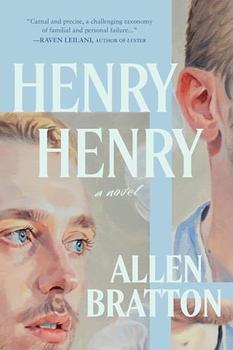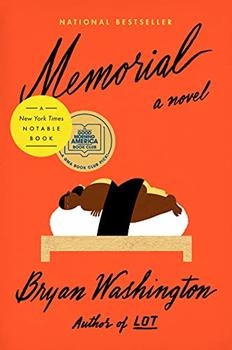Summary | Excerpt | Reviews | Beyond the book | Read-Alikes | Genres & Themes | Author Bio

Allen Bratton's Henry Henry chronicles a year in the life of Hal Lancaster. Readers already familiar with Shakespeare's history plays will immediately recognize the landscape of Bratton's novel in this modern-day queer reimagining of the Henriad. There's Hal, the disaffected, wayward son; Henry, the stoic, dutiful father; Ned Poins, the working class, rowdy youth with whom Hal spends his days; Falstaff, the has-been drunkard who's obsessed with Hal; and Harry Percy, the rival, the golden boy—the dutiful son who exhibits all the ideal aristocratic traits Hal lacks. Readers unfamiliar with the narrative off which Bratton is riffing will lose very little in translation, as Bratton's characters are vividly realized, all authentic in their own right.
When we meet Hal in the novel's first pages, he's hungover and feeling guilty that he hasn't been attending mass—two predicaments that will recur throughout the novel. Hal is rebellious and gay and Catholic, all of which he continuously grapples with as he knows he is to inherit his father's title of Duke of Lancaster one day. Instead of preparing for that role, Hal spends his days getting high, sleeping with his failed actor friend Jack Falstaff, and ignoring his father's calls.
Hal and his father Henry are positioned as opposites and adversaries, a dynamic which is only heightened at the gruesome reveal that Hal has been suffering a decade of sexual abuse at the hands of his father, casting Hal's self-destructive tendencies and his rejection of his family into a new light. Here, Bratton abandons Shakespeare's narrative blueprint for a more symbolic interpretation, as Henry's sexual abuse literalizes the cruel weight of legacy within the British peerage system.
Bratton's novel is relatively plotless, centered primarily on the development of Hal's character. Bratton reinterprets Shakespeare's climactic battle between Hal and Harry Percy as a romantic dalliance that ultimately serves the same narrative purpose—propelling Hal into the person he needs to be in order to honor his family's legacy. This journey is anything but smooth and linear, however, and Harry Percy is anything but a generous lover—this relationship merely serves as the backdrop for Hal's rocky path to self-realization. As Hal attempts to come into his own and reckon with his inheritance, the only way he can be ready to assume the title of Duke of Lancaster is paradoxically by disentangling his identity from his father and forging his own relationships with the members of the world into which he was born.
In Henry Henry, Bratton deepens the Henriad's motifs of legacy, succession, and responsibility by exploring them through a lens of queerness and trauma. Henry Henry is a bold, dark, and witty feat from debut author Allen Bratton, who seems to be off to a promising literary career, as he expertly explores myriad complicated themes without sacrificing the weight of any. Though the ways in which Bratton transposes the Henriad's narrative to its 2014 pre-Brexit setting are certain to excite readers with a penchant for Shakespeare's histories, his reimagining doesn't alienate those who don't share that same literary background. Henry Henry stands on its own as an undeniable masterwork of queer literary fiction, perfect for fans of Brandon Taylor and Garth Greenwell.
![]() This review
first ran in the June 5, 2024
issue of BookBrowse Recommends.
This review
first ran in the June 5, 2024
issue of BookBrowse Recommends.

If you liked Henry Henry, try these:

by Selby Wynn Schwartz
Published 2024
An exhilarating debut from a radiant new voice, After Sappho reimagines the intertwined lives of feminists at the turn of the twentieth century.

by Bryan Washington
Published 2021
What happens when a love story collides with the limits of love--and everyone has an opinion?
Your guide toexceptional books
BookBrowse seeks out and recommends the best in contemporary fiction and nonfiction—books that not only engage and entertain but also deepen our understanding of ourselves and the world around us.